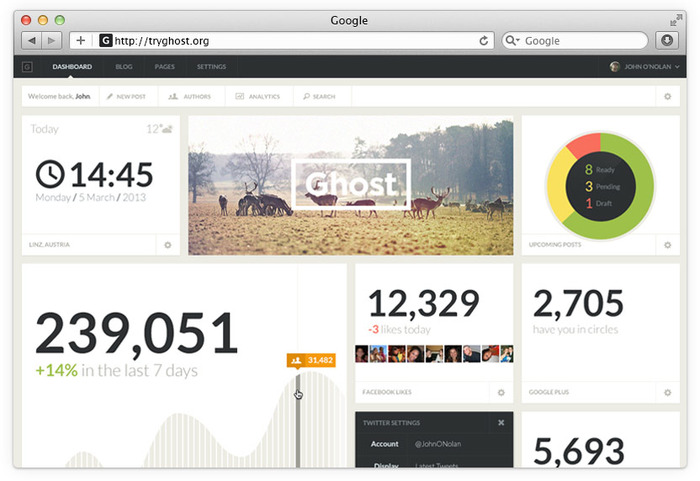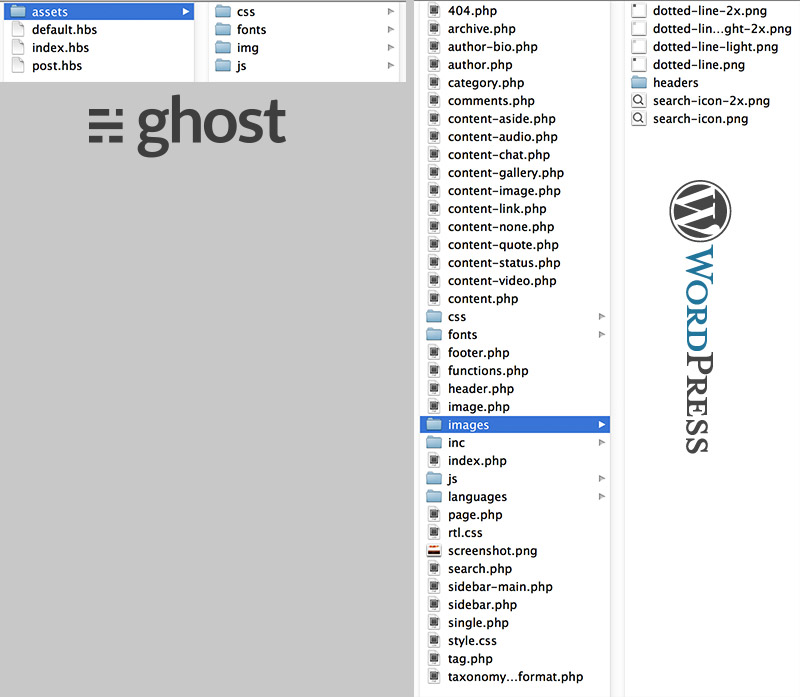Last year John O’Nolan caused quite a stir when he announced that he intended to fork WordPress to create Ghost, a new open source blogging platform.
O’Nolan posted his proposed designs for Ghost on his website, originally intending for it to be a minimalist concept of WordPress with a blog-oriented dashboard, fewer options to configure, no native comments, and very limited backwards compatibility.

The project was fully funded on Kickstarter and many in the WordPress community contributed, recognizing the value of the project as an alternative to what they perceived to be an increasingly CMS-focused WordPress core. The project actually raised more than $100,000 in its first 48 hours of funding and was recently backed by Microsoft.
Over the past year Ghost has evolved and the team eventually chose to build the application on Node.js, powered by the Express framework.
Why O’Nolan Decided Not to Fork WordPress
 I had the opportunity to chat with John O’Nolan about his journey with Ghost over the past year. I asked him why he and his development lead, Hannah Wolfe, decided to make Ghost a new application, instead of running with his original idea for a fork of WordPress.
I had the opportunity to chat with John O’Nolan about his journey with Ghost over the past year. I asked him why he and his development lead, Hannah Wolfe, decided to make Ghost a new application, instead of running with his original idea for a fork of WordPress.
O’Nolan explains why attempting to fork WordPress ended up being a dead end path for their team:
When I first put up the idea for Ghost, I suggested that it might be a WordPress fork. Ideas change a lot though, and after talking to a lot of very smart people about it (largely core+lead WordPress developers) it was clear that a fork would be the worst possible option. I followed up the original post with my intentions to build Ghost initially as a WordPress plugin proof-of-concept, and later as a standalone platform.
Initially we did start going down this road. Hannah and I started to build a WordPress plugin, but we hit so many roadblocks that it quickly became very clear this was going to be a dead-end path. A dead-end not necessarily because the technological challenges were insurmountable, but because we were realising the same frustrations that were the basis for Ghost in the first place: bumping up against, and working within, the limitations of both WordPress and PHP. Both from a technical standpoint as well as a philosophical one.
Once they settled the fact that the Ghost project was philosophically different from WordPress in many distinct ways, it was only natural that they select a new technological approach for building the platform. O’Nolan outlined the determining factors:
Once we’d decided to create something entirely new, the question of what language to go with was one of pragmatism. From that perspective the decision was clear. Today’s web is almost entirely JavaScript-driven. As well as being the backbone of every HTML5 API out there, it lends itself to high levels of scale, interactivity, responsiveness and robust user experiences for all of the same reasons. Extending our usage of JavaScript to both the back end with Node.js as well as the front end makes sense for all of these reasons. Our approach we feel is the best way to allow developers to create the next generation of engaging, cross-platform web experiences, whether that be touch, click, mobile or desktop.
Ghost was just released to 6,000+ Kickstarter backers and will very soon be opened up to the public on github. After that they have much more planned, including a hosted version.
How Ghost and WordPress Differ
While both projects are dedicated to providing users with open source software for publishing, they get there through very different approaches.
For example, the theming structure for Ghost is vastly different from that of WordPress, where the average theme is split into a couple dozen template files:
Ghost has prioritized its editor which uses markdown and “aims to allow you to type continuously, formatting on the fly, without clicking buttons or writing long HTML or switching tabs to preview your post.”
I asked O’Nolan if he thought that using markdown would be a hindrance to Ghost catching on, but so far he has received overwhelmingly positive reports of user experiences.
I actually think it’ll be a massive benefit to Ghost catching on. Markdown has, until now, been something that’s only really been exposed to the more technically minded users of the world and I firmly believe that it will become a standard for the future of writing on the web. There is a long way to go, of course, but we are now fortunate to have an incredible opportunity to be at the heart of the education process around Markdown. I’m really excited about how Ghost can influence and affect a new generation of writers on the web.
Beyond the differences in code, structure and features, Ghost takes a major departure from WordPress when it comes to a commercial marketplace. O’Nolan has confirmed that the Ghost project website will also include an open marketplace for both free and commercial plugins.
While the GPL might complicate an officially sponsored marketplace for WordPress, the Ghost project has adopted an MIT license that O’Nolan believes will offer more freedoms to their community.
With the MIT license you have the same freedom to decide how you want to engage with Open Source software. You decide whether your plugin is MIT, GPL, or any license you like. We believe feel that publishing needs the same freedom in software licensing decisions that it already enjoys with the content which is published.
The Hosted Version of Ghost
Realistically, you cannot expect everyone who wants to blog to have their own hosting and install the software for themselves. Many people have no time for managing hosting and software updates, hence the success of WordPress.com, which is currently ranked #8 for traffic in the US. Ghost intends to offer a hosted solution as well, with some notable differences.
While WordPress.com is one massive multisite installation, Ghost plans offer something more akin to a managed hosting solution. Ghost customers will enjoy their own hosted instances and will also be given full control of code and themes. This is essentially all the flexibility of WordPress.org with the support and reliability you’d expect from WordPress.com. All of the profits made from the hosted version of Ghost will go directly back into their non-profit organization to fund the improvement of the software.
How Ghost Might Affect and Influence the WordPress Ecosystem
Some are heralding Ghost as the future of blogging, a bold statement to bestow upon a very new open source project. Since Ghost was born out of O’Nolan’s dissatisfaction with WordPress for blogging, the two platforms are bound to be compared from time to time. O’Nolan believes that these comparisons will be beneficial for both projects.
Aaron Jorbin recently said, “Open source isn’t a zero sum game. We all win when we advance open source.” I think he’s spot on.
A couple of weeks after my original post about Ghost last year it was fantastic to see new core initiatives being rolled out to drastically improve the WordPress admin UI as well as a new back-to-blogging approach for the front end. These ideas ultimately came to life this year as they evolved into the MP6 plugin and the Twenty Thirteen theme.
O’Nolan believes that there is room for open source projects to learn from one another and push each other to provide users with the best possible publishing experience.
It’s a big open source world out there, and I think different projects can all learn a great deal from each other. In a couple of months I’ll be speaking at a Drupal Conference in Vienna. The organisers invited me to speak as a part of Drupal’s current initiative for developers to “get off the island,” which is very cool, and something I think the WordPress ecosystem could learn a lot from.
Ultimately when developers diversify and push each other to do better and try new things – the end user wins – and the entire open source ecosystem is strengthened further.
There’s no doubt that the WordPress community has benefited from the realization of the Ghost project, especially through all the discourse surrounding how to provide bloggers with the best possible experience on the web. Ghost’s intuitive editor and simplified dashboard challenge WordPress by demonstrating the possibilities of a more simplified UI.
WordPress is well on its way towards what Matt Mullenweg calls a “radically simplified” UI, but will that be enough for those who simply want to blog? Right now WordPress offers unparalleled flexibility for content managers. But these CMS capabilities can also make the WordPress dashboard an intimidating place for someone who only wants to blog.
The question remains – How can WordPress continue to move forward with more sophisticated support for CMS architecture without overwhelming the average blogger with too many options?


Great piece, Sarah!
I’ve been following Ghost for quite awhile. It was very interesting to see our friends over at WooThemes jump on board. And there’s no question that it looks gorgeous.
I’ve long thought that WordPress needed something to motivate it to make an elegant and inviting experience to the pure and fresh blogger. When I see projects like Medium, PostHaven, SVBTLE, it becomes more and more clear that WordPress is missing out on a gigantic opportunity. Most people coming to the Web just want a simple, no-frills platform to write and share a few images or videos.
So when this serious, open-source contender like Ghost comes along, I feel it will be a very good thing for WordPress. The development community will react to what Ghost has done, and I believe WordPress will snag a few pages from Ghost’s approach to result in a significantly simplified experience that meets the needs for people who are new to content publishing, while also maintaining the power and control that us power users desire.
WordPress can be that platform that not only enables the most incredible amount of control, customization, and community from a CMS, but I feel that one day WordPress can be the entry point for future and aspiring content creators. But it’s not completely there yet.
I’ve already seen time and time again when friends of mine who get started on a WordPress blog (and, in many of those cases, I’m the one setting them up), they post for a few times for maybe a month or two, and then they ask me for something simpler. They don’t want to deal with plugins or customizing themes. They don’t like seeing endless text fields with settings galore. They just want it to work.
Interestingly, over at ManageWP, we’re at the complete opposite end of the spectrum. We’re helping people who have complex businesses with dozens to thousands of websites to easily manage their sites. Even for the hardest of hardcore content publishers and hackers, they still desire a platform to make it very easy for them to get to business.
There’s still a lot of improvements that need to be made to WordPress. However, tackling the problem of complexity, so that people who are just wanting to get started blogging can go easily pick WordPress, seems to be the way to go. I look forward to seeing what Matt and the WordPress community is going to come up with next.
In the end, I hope that this will result in everyone in the WordPress ecosystem benefiting greatly in the future.